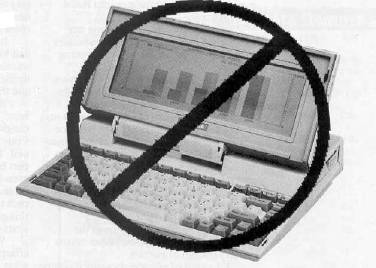Fear of Flying with Laptops
When a terrorists' bomb exploded on Pan Am Flight 103 over Lockerbie, Scotland last December, it riveted world attention on what passengers could carry on board. Air-traveling laptop-computer users are just starting to feel the impact.
Once just another carry-on, the laptop's maze of wires, circuits, and chips present a thorny technical problem to airport security agents: how to distinguish between what's an essential part and what's a terrorist's tool.
"Everybody's hyper about anything being brought on an airplane anymore," said John Galipault, president of the Aviation Safety Institute.
John Farrar, a spokesperson for the Federal Aviation Administration, said banning laptops and other electronic equipment is a consideration.

Secretary of Transportation Samuel Skinner announced in June a new policy requiring all U.S. air carriers with flights originating in Europe and the Middle East to step up inspection of electronic equipment, including laptops. Any equipment that doesn't pass inspection won't be allowed on the aircraft. At that time, no policies had been announced for domestic flights.
Galipault said that banning laptops on domestic flights would create an inconvenience. Terrorists have had the most success on international flights, he said.
Naturally, laptop-computer makers are keeping a wary eye on what the government does and how airlines deal with the situation.
"We've been trying not to take it terribly seriously," said Keith Comer of Toshiba.
Comer hopes that if laptops do come under increased scrutiny, users could simply boot up the computers during airline security checks.
The airlines themselves are responsible for security. But they've adopted a wait-and-see attitude, looking for some word from the government that concerns laptop-computer policy.
—Jeff Sloan